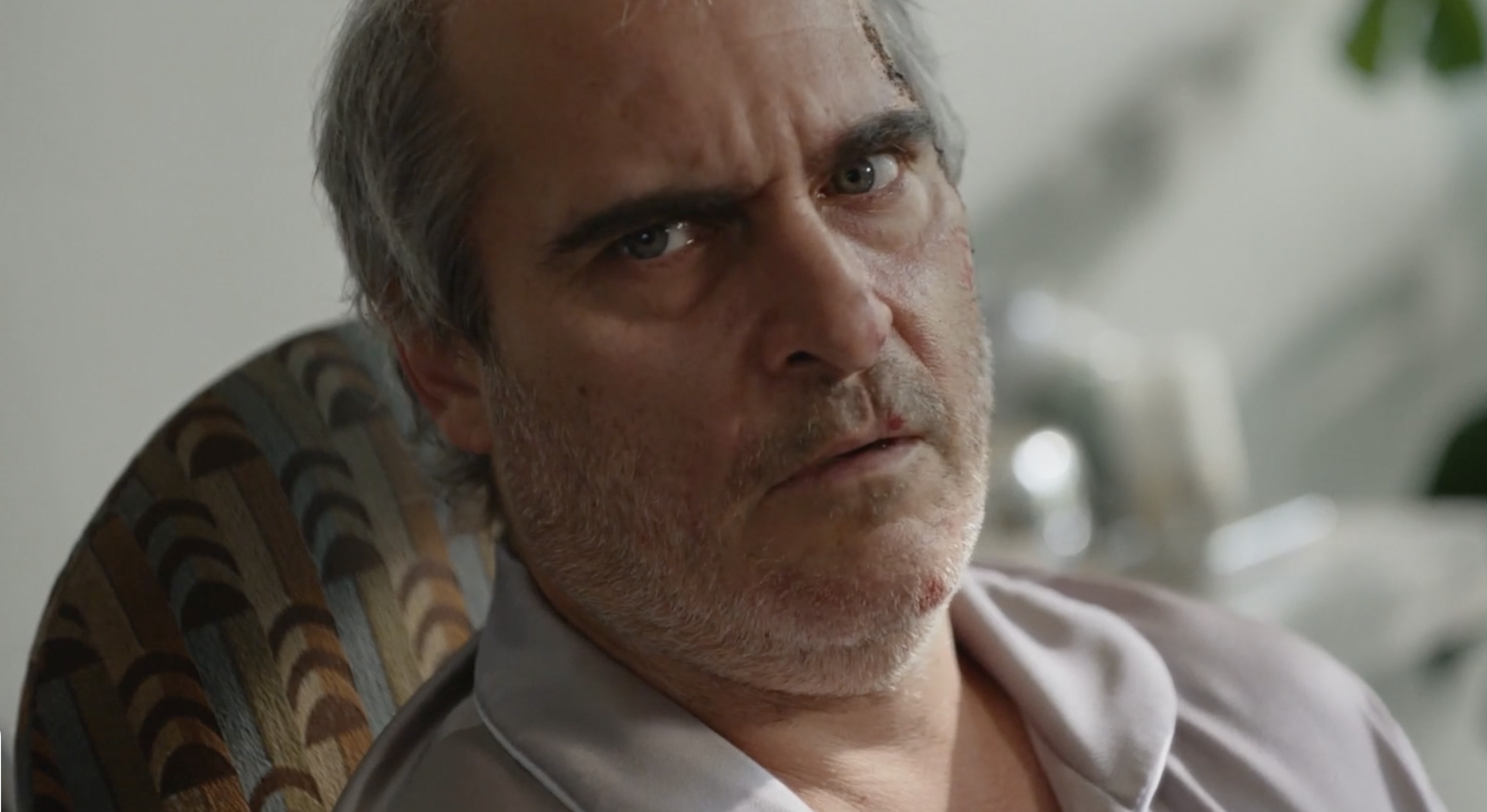
Two minutes into Ari Aster’s Beau Is Afraid, we get a scene where the titular Beau is having a therapy session. Entering his therapist’s office, Beau is on edge but eventually works up a conversation. “I accidentally drank mouthwash Friday night,” he says, adding, “You can’t get stomach cancer that way.”
While it appears that Beau is stating a fact, what he’s really doing is seeking validation. As someone with Obsessive-Compulsive Disorder (or OCD), I found the scene eerily relatable and laughed. There have been hundreds of times in my life where I’ve been afraid of something—aware of all the logic surrounding said fear—and have sought validation from others. The fear in those moments is so great, and I want to trust myself, but the comfort of another’s words will “prove” that I don’t have to worry.
The therapist replies and tells Beau he won’t get stomach cancer from one instance of swallowing mouthwash. Beau quickly adds that he drank a mouthful of mouthwash a couple of weeks ago, too, and his therapist reassures him again. My laughing slowed down and I said, “Oh, this is too relatable.”
Also Read: Ari Aster’s Lost Film Is Also His Most Disturbing [Watch]
The film’s premise involves Beau embarking on a journey to attend his mother’s funeral. That may read as straightforward. But what ends up playing out is anything but. Beau is a very anxious man who has major mommy issues, and on the way to his mom’s funeral, he encounters an array of upsetting, violent, and goofy situations.
While the particulars of Beau’s mental health aren’t stated explicitly, this scene got me thinking that he might have Obsessive-Compulsive Disorder. OCD, as defined by the National Institute of Mental Health, is “a long-lasting disorder in which a person experiences uncontrollable and recurring thoughts (obsessions), engages in repetitive behaviors (compulsions), or both.”
Although exceptions exist, OCD has often been utilized as the brunt of a joke in media, such as in the TV show Monk and the 1991 film What About Bob? Typically, the individual with OCD is shown neurotically counting, washing, or checking things. Such symptoms are common in OCD sufferers, but the portrayals in these works are primarily used for laughs. However, Aster’s approach to portraying mental illness in Beau Is Afraid is far more nuanced compared to those examples. Whereas Aster utilizes humor throughout the film, the comedy never undercuts Beau’s suffering; it aids in highlighting it.
Also Read: ‘Beau is Afraid’ is Ari Aster’s Most Disturbing Film—Here’s Why
While I found recognizable traits of OCD in Beau’s actions (e.g., seeking validation, intense fear, and anxiety), much of my read comes from the world he inhabits. The world of Beau Is Afraid is a frenetic, hostile experience: A group of people encourages a man to jump off a building to his death and a man runs around naked stabbing people in the streets. It’s an absurdist take on our reality, where random cruelties and vulgarities happen abruptly.
Keeping in mind that the film is operating with some level of absurd narrative logic, I think much of what we’re seeing is how Beau views the world around him. After the therapist scene, the idea that he has OCD really struck a chord with me. I watched as he exited the office and walked around the city where he lives. We get that scene where onlookers are encouraging a guy to jump from a building, and in the same public area, someone is openly handling an assault weapon. As more random chaos started to appear around Beau, another thought came to mind: this is a solid metaphor for OCD intrusive thoughts.
Also Read: ‘Beau Is Afraid’ Runs On Pepto Bismol
My OCD comes in the form of bombarding intrusive thoughts, racing thoughts that cause me to spiral with anxiety, terrified that I can’t trust myself. This is the side of OCD you don’t often see portrayed in media, where the sufferer is hit with violent, sexual, or blasphemous thoughts. Along with the subject matter, these thoughts often cast the individual as an antagonistic force. For example, upon picking up a dinner fork, the OCD individual may be struck with a thought that involves stabbing someone they love. Of course, they would never act upon this, but whereas other folks can brush off such thoughts relatively easily, the OCD-ridden individual becomes consumed by guilt. The world of Beau Is Afraid operates like a racing mind; there’s no logic as to why the various shocking actions take place. They just do.
Rather than the absurdity of Beau’s situations playing out as straightforward comedic scenes, humor’s purpose throughout the film is to highlight Beau’s suffering. Besides some exceptions, comedy is delivered alongside moments of horror. For example, after learning about his mother’s death, Beau takes a bath, only to look up and see a man clinging to his walls. The musical score swells with tension as Beau stares in shock, the man clinging to walls afraid to fall. Eventually, the man falls on the naked Beau, and the two roll around together in the tub.
Also Read: 10 Perfect Halloween Films To Stream For Free on Fawesome
For some folks, such scenes might come across as funny, which I think is intentional. While Aster has made a name for himself as an arthouse filmmaker, take one look at his pre-Hereditary filmography and you get a different picture of him. Embracing various vulgar and sexual taboos, the bulk of his short films lean heavily into dark comedy.
In the hands of Aster though, humor is often used to punch up underlining terror, 2013’s Munchausen being a great example of over-the-top melodrama turning ugly. Though Aster throws Beau into many upsetting situations, Beau is rarely the brunt of jokes, nor are we intended to ridicule him. Rather, Aster’s blend of comedy and horror works to elicit a complex concoction of emotion within the viewer, creating an anxious energy that’s somewhat relatable to what Beau’s going through.
Although Beau is a paranoid individual, he’s never painted as feeble. He can take care of himself, and this is another reason why I think the humor of Beau Is Afraid works so well. While some of the humor can feel cruel, it’s never in a poking fun manner, only functioning to serve the narrative’s point. Beau is a smart guy who knows what’s up, it’s just that he’s been dealt a shit hand of neuroses that overpower him at times.
Also Read: In M. Night Shyamalan’s ‘Trap’, Work-Life Balance Is The Real Killer
Along with the extremities of Beau’s world, there’s another aspect that further engrossed me in my OCD read. There are multiple instances where people approach Beau in unnerving manners, either being aggressive or secretive. A note subtly passed to him that reads “Stop incriminating yourself;” a verbal jab of “You need to stop the humiliation,” the latter used against him while injured and struggling to attend his mother’s funeral. In such scenes, Beau is being lobbed with guilt, which further exacerbates his anguish and causes him to feel he needs to work harder to get to his mother’s funeral. For context, by this point in the film, Beau has been hit by a car, stabbed multiple times, and held at gunpoint.
When it comes to OCD, it’s possible to gaslight yourself into believing you’re at fault for something, that you’re not as self-aware as you should be, or that you could be doing more. Guilt is one of the most destructive aspects of OCD, and that guilt turns into a myriad of fears. You love your family and friends, and then you have an intrusive thought that involves harming them. You know you would never do that and how much you adore them, but rather than zeroing in on the facts, you become racked with guilt.
That guilt morphs into a compulsion that you do hoping not only to escape the guilt, but to also “absolve” yourself. What are you absolving yourself from though? You’ve done nothing, you would never do anything. But the guilt, the guilt eats at you and makes you feel awful – so you’re driven by compulsion to get rid of it.
Also Read: There’s a Special Place in Hell for Minnie Castevet
After a particularly brutal intrusive thought, I’ve spent an exorbitant amount of time questioning myself, thinking I’m an awful person. I know I’m not, and yet, OCD hooks me in this constant self-questioning: Well, if I’m a good person, I wouldn’t think such things. Good people don’t think like that. I’m really lying to myself, I’m guilty.
I don’t know if Aster suffers from OCD himself, but whether he does or doesn’t, he seems to understand the nuances of dread, anxiety, and guilt associated with the disorder. There was a time in my life when I was afraid to talk to anyone about my OCD, terrified of judgment and misunderstanding. I’m tempted to overly relate to Beau; there are major differences between him and me, but there are similarities for sure.
Lately, I’ve been doing a lot of work in therapy to not associate myself with my illnesses: I’m not my depression, my anxiety, my OCD. I am, unfortunately, burdened by these things, but I’m not them. Thankfully, my story is much different than Beau’s, for after years of therapy and personal growth, I’ve found a community where I can talk about my OCD and feel loved. I wish I could’ve seen that same love for Beau in the film. Instead, his life became consumed by anxiety and guilt.
Also Read: Before Art The Clown, There Was ChromeSkull
Beau Is Afraid has layers to its thematic exploration, and among them, it shows how horrifying it can be to live with mental illness. How isolating it can feel when you’re terrified of your surroundings and struggling to communicate your fears; how nerve-racking it can be when you fear judgment from others; how the constant bombardment of intrusive thoughts can leave you feeling depleted. How every day can feel like a battle.
When constructing a portrayal of mental illness in film, one of the most powerful outcomes one can achieve is eliciting sympathy from an audience. Although Beau Is Afraid doesn’t speak for everyone with OCD, I find myself deeply moved by it. In Beau Is Afraid, Ari Aster provides a bizarre tapestry of genre, where comedy and horror come together to illustrate a nightmare I’ve endured throughout my life, and that no one can see.
Categorized:Editorials


